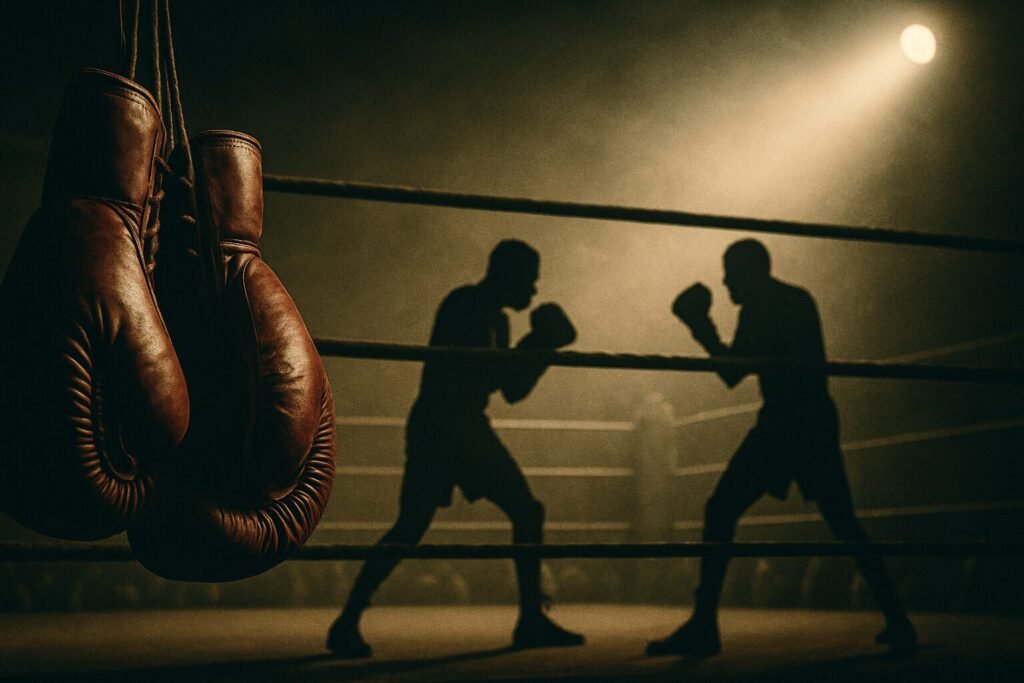The Pull of the Return
There’s nothing quite like a comeback in boxing. The buzz of an arena when a fighter who swore they were done walks back through the ropes is intoxicating. Fans convince themselves they’re about to relive the glory nights. Fighters convince themselves their bodies still remember. But time is ruthless, and the boxing comeback curse is real.
I’ve already looked at the culture around it — the psychology, the money, the nostalgia — in this piece on boxing’s comeback obsession. This time, the focus is different. Not why they come back, but what happens when they do.
Ricky Hatton: Broken by His Own Weapon
Few comebacks carried as much emotion as Ricky Hatton’s return in 2012. After years battling depression and addiction, Hatton wasn’t chasing cash — he wanted closure. Manchester’s Arena was rocking like it was 2005 again, the crowd desperate to see their hero rise one last time.
For a few rounds, it almost looked possible. Hatton boxed sharply, but then came the cruelest twist. Vyacheslav Senchenko landed a left hook to the body — the very punch Hatton made his trademark — and “The Hitman” folded. It was poetic in the darkest way.
The boxing comeback curse didn’t just beat Hatton, it humiliated him with the very weapon that once made him great. For all the belts he won and nights he lit up, too many fans remember that heartbreaking image on the canvas.
Mike Tyson: The Aura Shattered
By 2005, Mike Tyson was a name more than a force. Against Kevin McBride, he was bullied, leaned on, and outmuscled by a fighter who wouldn’t have lasted a round with the Tyson of 1988. When Tyson quit on his stool, he admitted: “I don’t have the heart for this anymore.”
It was the final stamp of the curse. The same man who once terrified the heavyweight division left the sport looking tired, beaten, and human. For younger fans, that fight is their only live memory of Tyson in action — not the rampaging destroyer who blew away Spinks or Berbick.
Ali vs Holmes: The Saddest Chapter
If one night defines the cruelty of boxing comebacks, it’s Muhammad Ali versus Larry Holmes in 1980. Ali’s body was failing, his speech already slurred, yet he convinced himself he could return. What followed was a punishment. Holmes, his former sparring partner, wept as he battered the shell of the man he idolised.
Ali had nothing left — no legs, no reflexes, no defence. For ten rounds he absorbed punishment until Angelo Dundee threw in the towel. It was less a fight than an execution of a legend. The boxing comeback curse here wasn’t just defeat, it was the destruction of an aura.
Why Fighters Risk It Anyway
The reasons aren’t complicated. Pride. Money. The buzz of the crowd. For some, like Hatton, it’s about closure. For others, like Tyson, it’s about paying off debts. But the thread is the same: fighters think they’ll be the exception.
The problem is, boxing is built on timing and reflexes. Once they go, they don’t come back. The gym can fool you — sparring isn’t the same as fight night. Under the lights, the truth comes out, and the curse is waiting.
The Rare Exceptions
George Foreman ripped up the script when he reclaimed the heavyweight title at 45. Sugar Ray Leonard stunned Marvin Hagler in 1987 after years away. Bernard Hopkins turned his 40s into a second career, beating world champions half his age.
But these are exceptions that prove the rule. For most, comebacks end in painful reminders of time’s power. And that’s why the boxing comeback curse has its reputation — the odds are always stacked against the fighter, no matter how big their name.
Final Bell
The boxing comeback curse doesn’t respect legacy. It’s beaten Ali, Tyson, Hatton and countless others. For every fairy-tale ending, there are dozens of sad farewells. Fighters tell themselves it won’t be them. History says otherwise.
What about you — do comeback defeats ruin a fighter’s legacy, or are they just part of the full story? Drop your thoughts in the comments, and check out more at CMBoxing.

